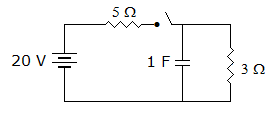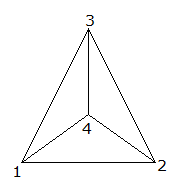ECE :: Network Analysis and Synthesis
-
Which of the following pairs are correctly matched?
- Brune's realisation : realisation with ideal transformer.
- Cauer realisation : ladder realisation.
- Bott Duffin realisation : with non ideal transformer.
-
The synthesis of minimum function was suggested by
-
A 3 phase balanced supply feeds 3 phase unbalanced load. Power supplied to the load can be measured by using
- 2 wattmeter
- one wattmeter
- 3 wattmeter
-
Which of the following is correct for a driving point functions?
-
An infinite ladder is constructed with 1 Ω and 2 Ω resistors shown below.

-
In the circuit of figure the voltage across capacitor when switch is closed at t = ∞ is

-
In the series circuit shown in figure, for series resonance, the value of the coupling coefficient, K will be

-
In an RC series circuit R = 100 Ω and XC = 10 Ω. In this circuit


 Whatsapp
Whatsapp
 Facebook
Facebook



 R = 2
R = 2 .
.

